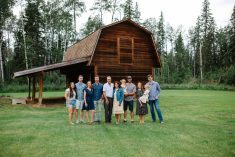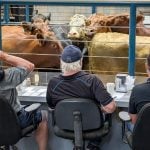Like other farmers who market and deliver their own grain, Nick Hoffsuemmer always knew a lot about contracts, delivery requirements, discounts, grades and all the assorted things that most farmers who sell their crops to the local elevator get to know. But Hoffsuemmer didn’t expect to end up getting into the elevator business.
When he expanded his farm’s existing grain system in 2015, though, that changed in a major way. Like a lot of other farmers, Hoffsuemmer had wanted to install a larger capacity grain dryer for the farm near St. Thomas in southern Ontario, plus a bigger grain handling system with more bin space.
Again, like a lot of other farmers, the goal was to build it big enough to allow for more growth in the future if the farm expanded its own production.
Read Also

‘No agenda, no attenda’: How to professionalize your family farm meetings
Establishing meeting ground rules can help a farm family find ways to communicate that work for the business and the family.
But because it was more than the farm actually needed at the time, in order to offset the cost and maximize use of the dryer, Nick decided he could offer custom drying and purchase grain from nearby farmers.
“We started really small,” he says. “It started with that dryer, and the dream of having something that was more modern, bigger and had the capacity to make harvest easier for ourselves.
“From that it snowballed. Originally, I just talked to a few neighbours and then it started to grow naturally.”
And that wasn’t all that changed. With more and more farmers selling their grain through the elevator, that part of the farm business was becoming close to a full-time job and was too much for Nick to handle alone, so his wife Michelle left teaching and joined the elevator full-time.
Their customer base has grown so much in the last four years that they have consistently been adding more storage bins and they underwent a significant expansion in 2022 that added another two bins to bring total storage capacity to 1.1 million bushels. They also installed a third, high-capacity unload pit to cut down on unload wait times and move customers through faster.
Challenged with learning
Nick and Michelle both took grain grading courses and obtained all the relevant licences through Agricorp to buy, sell and grade grain and run a commercial elevator. But learning the elevator business has been a challenge, especially for Michelle, who handles the majority of the buying, selling, marketing, accounting, advertising and customer service.

Having worked at an agricultural risk management firm for a while before becoming a teacher, she understood futures contracts and markets, which helped. But that was just the beginning.
“In years where the market is rallying and our customer base is expanding, the financial requirements have been a big learning curve,” she says.
“It’s a wonderful thing when you are growing but it makes it more challenging to project financial needs. You always want to be in front of it and thinking long-term, so we try to project forward as much as possible so that we are prepared for the ‘what ifs.’”
Michelle prioritizes customer service and building relationships, both of which are integral to their business model. These are core values that she and Nick believe have set their business apart and helped it grow in a sector where farmers strongly value relationships.
She also learned more about what it takes to do it all better.
Time is part of it. “A big part of relationship building with our customers comes with experience, because the more experience you have, the more comfortable you are with your subject matter and the easier those conversations become,” Michelle says.
But there’s more too. “I know our business inside and out,” she says. “That gives me confidence. It’s about figuring out what our individual customers need, because at the end of the day this is as much a people business as it is a grain business.”
Key to any relationship is communication and again, and Michelle sends out a daily bid sheet via email that gives a brief update of the factors currently influencing the markets, and she maintains an open-door policy.
“We put customer service at the forefront and that is what we strive to excel at. I have great respect for the fact that many of our customers are our neighbours,” she says. “We have these relationships that have grown over time. And we don’t take them for granted.”
Learning to prioritize
The Hoffsuemmers work well together, and over time they have defined their own clear roles and trust in each other’s abilities.
“We have a level of understanding of what the other is doing but we are master of our own tasks, and I think that’s important,” Michelle says. “You have to have that trust. Otherwise you’re not managing your time efficiently.”
Currently, the only employees at the elevator are seasonal, but it is reaching a point where they need a larger staff. In the meantime, they have developed a system of triaging and prioritizing to help them manage their immediate and longer-term tasks.
“Especially during harvest when it’s a very busy time, you know the tasks that you have to do: the tasks you do on a daily basis, first thing in the morning, at the end of the day, throughout the day and those are the ones that you make sure get done,” Michelle says.
“Things that aren’t necessary in that moment get put on the backburner. But communicating with a customer, getting out the bid sheet, buying and selling grain, making sure the grain has been received, those are things that have to be done. Focusing on our customers and what they need comes first.”

An enviable transition
Nick’s father, Ernst, immigrated from Germany in the 1970s and purchased the farm, and Nick and Michelle met while at the University of Guelph. When Michelle came on board full-time four years ago to manage the grain elevator side of the business, that allowed Nick to focus more on farming their 3,000 acres of corn, wheat and soybeans.
The Hoffsuemmers’ farm transition is more or less complete; an enviable stage that many other family farms struggle to reach, and Nick credits his dad, Ernst, for being so willing to plan ahead and for knowing when it was time to take a back seat.
“We all have our family issues when it comes to how things are run now and how things were run, or how Dad would like to see them run maybe, but I think that’s pretty standard on any business that transitions,” Nick says. “But it was all pretty absolute; we had everything written up with dates and timelines.”
But another big factor is that right from the start of his full-time farming career, Nick has preferred to keep his own operations separate. Nick began by renting some acres to start farming, and while his dad retained ownership of the main farm, they shared some equipment and swapped labour while Nick prepared to eventually take over the main farm.
“When I started farming full-time in 2011, I started my own business, Hoffsuemmer Farms,” Nick says. “It was two separate companies. I did all my own books, buying, planning and cropping right off the get-go. That helped me get to the point where I took over the main farm in 2017. I think six years under my belt managing less acres, with less equipment made that transition a little smoother, just having that experience.”
The elevator is also a separate entity that has always been owned by Nick and Michelle and has never been a part of the main farm. By keeping his own enterprises separate from the beginning, not only did it build equity but also meant he was building a business reputation in his own right, not in the shadow of a successful farming parent.
Nick now had a good, stand-alone track record when he needed money to invest in the elevator. By then, he already had a good relationship with his bankers and suppliers who trusted his business skills and management ability.
“It made everything easier with the bankers, the seed guys that I’m buying from, it was creating those relationships even down to buying or servicing equipment,” Nick says. “It definitely helped on a lot of fronts to have that experience.”
It also helps that Nick has a penchant for numbers and knows how to put together a business plan and cash-flow projections, partly thanks to taking the CTEAM (Canadian Total Excellence in Agricultural Management) program from 2018 to 2020.
“The courses that I’ve taken have taught me a lot about financials and how to look at them and break them down to see how you’re doing,” Nick says. “It’s all projections; we’re projecting that we’ll take in this much and be able to sell it for this much, and be able to cover our costs and hope to make a little money. Being able to write that down, break it out, and show your banker that you know those numbers builds trust.”
Goals evolve
Starting out, Nick and Michelle’s goal was simply to run a profitable farm, but as they saw more opportunities to diversify and develop new ventures, that goal, though still a guiding principle, has evolved into a different philosophy that embraces change and has taught both of them to be flexible.
“Every year has plenty of challenges, but the biggest challenge is trying to roll with it, and figure out the best way to deal with things,” Nick says. “With farming there’s always something that could keep you up at night and ruin your day but you have to try not to not let it, and get into a mindset where you don’t get upset or overly stressed when things go wrong or your day doesn’t go the way you wanted it to.”
As an example, the morning of our first interview, Nick was late because of an elevator issue.
“The distributor went and it put some beans on top of corn which is not good but we caught it early enough and were able to clean it up and it’s not too big of a deal,” he explained.
“At first, I was upset about it but in the end, you just have to figure out how to fix it so it doesn’t happen again. I feel I get better at rolling with things every time something happens.”
Looking ahead, Nick and Michelle are hopeful they will find the right employee or two to allow them to take more leisure time away from the farm with their two children without being tied to their phones or laptops.
Overall, they want to see continued growth as long as it’s sustainable and manageable. On the cropping side, Nick continues to seek new technologies and innovations to make the farm more efficient. On the elevator side, it’s still all about relationships, delivering on service and treating people with respect.
“Our name is our brand and there’s an immense satisfaction when you’re building something that is yours and you can see the growth and how far you’ve come, and you can run a business and go about your day in a way that meets your values,” Michelle says.
“The decisions you make in a day have to be good financial decisions and good for your business but they have to suit your personal goals as well.”
















